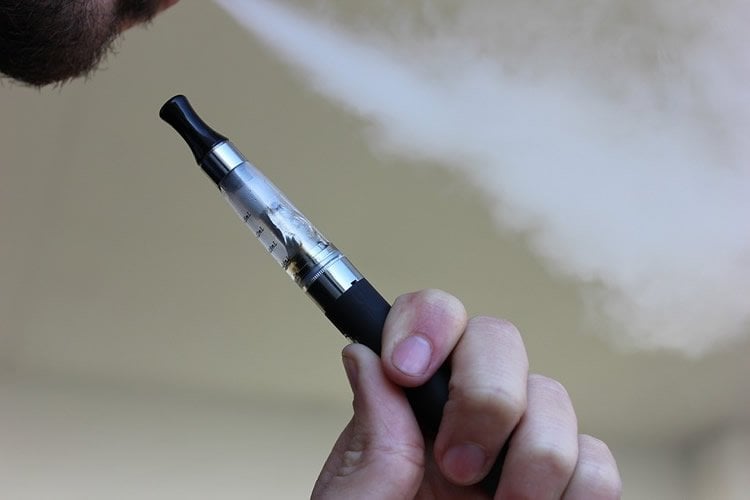Summary: A new study reveals smokers have lower levels of Baceroids in their microbiome. In contrast, the levels of Bacteriods were the same level in vapers as in non-smokers. Decreased Bacteriod levels are associated with obesity and Chron’s disease.
Source: Newcastle University.
The first study of its kind has found that people who vape have the same mix of gut bacteria as non-smokers, whilst smokers have significant changes to their microbiome.
The international team of researchers led by Newcastle University, analysed the bacteria of tobacco smokers, users of e-cigarettes and non-smokers from samples throughout the digestive tract, including in the mouth and gut.
Significant changes were found in the gut bacteria of the smokers, with an increase in the Prevotella bacteria which is linked to an increased risk of colon cancer and colitis.
There was also a decrease in the presence of Bacteroides in smokers, a beneficial bacteria or probiotic. A lower level of Bacteroides has been associated with Crohn’s disease and obesity.
In contrast, the gut flora of those using e-cigarettes was the same as a non-smoker.
Lead author of the study was Dr Christopher Stewart from the Institute of Cellular Medicine at Newcastle University who published the findings today in PeerJ. He explains: “The bacterial cells in our body outnumber our own human cells and our microbiome weighs more than our brain, yet we are only just beginning to understand its importance on our health.
“More investigation is needed but to find that vaping is less-damaging than smoking on our gut bacteria adds to the incentive to change to e-cigarettes and for people to use them as a tool to quit smoking completely.”
Comparing microbiota
This pilot study is the first to compare microbiota in tobacco smokers and electronic cigarette users.
Samples were taken from 10 e-cigarette users, 10 tobacco smokers and 10 controls who didn’t smoke. Faecal, mouth (buccal) and saliva samples underwent targeted gene sequencing to identify the bacteria present.

This revealed significant changes in the gut bacteria of the faecal samples.
In the mouth and saliva samples, which are sites directly exposed to the smoke or vapour, the researchers also found that the bacteria in smokers was different to those of the non-smokers. However, like in the gut, the bacteria in the mouth and saliva samples were similar in e-cigarette users and non-smokers.
Dr Stewart adds: “This research comes as we see a huge increase in the numbers of people using electronic cigarettes and it becomes increasingly important that we understand the effect on the human body.”
As more people take up vaping, the team call for further research to be carried out and to follow up on this pilot study, they are aiming to study a much larger group over a longer period. They also suggest that further investigation into sex-specific microbiota profiles is carried out, as this study involved only two women.
Source: Karen Bidewell – Newcastle University
Publisher: Organized by NeuroscienceNews.com.
Image Source: NeuroscienceNews.com image is in the public domain.
Original Research: Open access research for “Effects of tobacco smoke and electronic cigarette vapor exposure on the oral and gut microbiota in humans: a pilot study” by Christopher J. Stewart, Thomas A. Auchtung, Nadim J. Ajami, Kenia Velasquez, Daniel P. Smith, Richard De La Garza II, Ramiro Salas, and Joseph F. Petrosino in PeerJ. Published April 30 2018.
doi:10.7717/peerj.4693
[cbtabs][cbtab title=”MLA”]Newcastle University “Vapers and Non-Smokers Have the Same Flourishing Gut Flora.” NeuroscienceNews. NeuroscienceNews, 30 April 2018.
<https://neurosciencenews.com/non-smoker-vaper-microbiome-8917/>.[/cbtab][cbtab title=”APA”]Newcastle University (2018, April 30). Vapers and Non-Smokers Have the Same Flourishing Gut Flora. NeuroscienceNews. Retrieved April 30, 2018 from https://neurosciencenews.com/non-smoker-vaper-microbiome-8917/[/cbtab][cbtab title=”Chicago”]Newcastle University “Vapers and Non-Smokers Have the Same Flourishing Gut Flora.” https://neurosciencenews.com/non-smoker-vaper-microbiome-8917/ (accessed April 30, 2018).[/cbtab][/cbtabs]
Abstract
Effects of tobacco smoke and electronic cigarette vapor exposure on the oral and gut microbiota in humans: a pilot study
Background
The use of electronic cigarettes (ECs) has increased drastically over the past five years, primarily as an alternative to smoking tobacco cigarettes. However, the adverse effects of acute and long-term use of ECs on the microbiota have not been explored. In this pilot study, we sought to determine if ECs or tobacco smoking alter the oral and gut microbiota in comparison to non-smoking controls.
Methods
We examined a human cohort consisting of 30 individuals: 10 EC users, 10 tobacco smokers, and 10 controls. We collected cross-sectional fecal, buccal swabs, and saliva samples from each participant. All samples underwent V4 16S rRNA gene sequencing.
Results
Tobacco smoking had a significant effect on the bacterial profiles in all sample types when compared to controls, and in feces and buccal swabs when compared to EC users. The most significant associations were found in the gut, with an increased relative abundance of Prevotella (P = 0.006) and decreased Bacteroides (P = 0.036) in tobacco smokers. The Shannon diversity was also significantly reduced (P = 0.009) in fecal samples collected from tobacco smokers compared to controls. No significant difference was found in the alpha diversity, beta-diversity or taxonomic relative abundances between EC users and controls.
Discussion
From a microbial ecology perspective, the current pilot data demonstrate that the use of ECs may represent a safer alternative compared to tobacco smoking. However, validation in larger cohorts and greater understanding of the short and long-term impact of EC use on microbiota composition and function is warranted.






